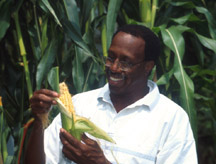This page has been archived and is being provided for reference purposes only. The page is no longer being updated, and therefore, links on the page may be invalid.
|
Link to:
|
Charles Bacon Tops ARS Scientist of the Year Award WinnersBy Sharon DurhamFebruary 7, 2001 BELTSVILLE, Md., Feb. 7--Charles Wilson Bacon, a U.S. Department of Agriculture microbiologist, has been named "Distinguished Senior Research Scientist of the Year" for 2000 by the Agricultural Research Service. It is the top scientific honor given by ARS, the chief scientific research agency in USDA. Bacon is being honored for conceiving, developing and implementing biological control research to prevent plant disease and to control fungal toxin production in plants. A supervisory microbiologist and research leader for the Toxicology and Mycotoxin Research Unit in Athens, Ga., Bacon focuses his research primarily on the growth, physiology and biochemistry of toxic fungi. "Dr. Bacon leads a group of ARS scientists whose creativity is nationally recognized and whose research efforts, individually and combined, have led to many important research findings," ARS Administrator Floyd P. Horn said. "His research has influenced the development of all aspects of research scientists at major universities that study toxic fungi that affect forage plants and other crops."Horn will present awards to Bacon and other ARS honorees at a ceremony today at the ARS Henry A. Wallace Beltsville Agricultural Research Center. The scientists will receive plaques, cash awards and additional research funding. One aspect of Bacon's research is the control of Fusarium moniliforme, a fungus that attacks corn plants and produces a toxic substance called fumonisin. This toxin--called a mycotoxin--can affect both animals and people that eat infected corn. By understanding the interactions of this fungus with other organisms, Bacon discovered that through a process called competitive exclusion, a bacterial organism called Bacillus subtilis can be used to treat corn and literally "crowd out" other, undesirable fungal organisms. By excluding the undesirable fungus from the corn plant, the production of the mycotoxin is reduced or eliminated. |
|
|
Research conducted under a Cooperative Research and Development Agreement (CRADA) with industry partners indicated that Bacillus subtilis, in addition to controlling the colonization of corn by undesirable fungi, reduced the mycotoxin content in corn under field conditions. A new CRADA will focus on molecular modification of B. subtilis, identification of the substance it produces to block invasion by F. moniliforme, and determination of its potential as a commercial control for F. moniliforme. Bacon earned bachelor's degrees in biology and chemistry from Clark College in Atlanta and his doctoral degree from the University of Michigan. In addition to his research activities, Bacon serves on the board of the Journal of Applied and Environmental Microbiology and is a founding member and the treasurer of the International Symbiosis Society. During his career--including one year as a research associate at the University of Michigan and 27 years as a research scientist at ARS' Russell Agricultural Research Center at Athens--Bacon has written or co-written more than 150 scientific publications and more than 135 abstracts, and co-edited three books. |
|
|
ARS will also honor Barbara J. Baker, Stephen O. Duke, and Mohammad Koohmaraie as "Outstanding Senior Research Scientists of 2000." Baker directs research at the agency's Plant Gene Expression Center in Albany, Calif. Duke leads research at the Natural Products Utilization Research Unit in Oxford, Miss. Koohmaraie directs research activities at the Roman L. Hruska U.S. Meat Animal Research Center's Meats Research Unit in Clay Center, Neb. Baker is being recognized for her outstanding achievements in research, leadership and training activities, especially in advancing the scientific understanding of the mechanism of plant disease resistance for crop improvement. Duke is being honored for outstanding performance in fundamental plant physiology research in support of weed science and natural product research. Koohmaraie is being cited for innovative research and project leadership to enhance meat quality and safety. |
|
|
The agency also named four "Area Senior Research Scientists of 2000." They are:
|
|
|
|
|
|
|
|
|
ARS is also honoring scientists who are in the early years of their careers. These "early career awards" recognize the achievements of scientists who have been with the agency for seven years or less, and earned their highest academic degree within the past 10 years. |
|
|
This year, the top award in this category will go to Cindy D. Davis as the Herbert L. Rothbart Outstanding Early Career Research Scientist of 2000. Davis supervises research at the Chronic Disease Laboratory of the ARS Grand Forks (N.D.) Human Nutrition Research Center. She is being honored for new insights about nutritional determinants of cancer--information that may improve public health. Seven other Area Early Career Scientists are being honored by ARS. They are: |
|
|
|
|
|
|
|
|
|
|
|
|
|
|
|
|
|
|
|
|
|











